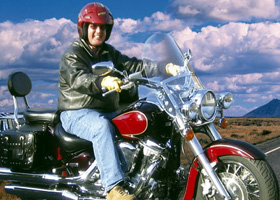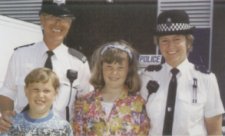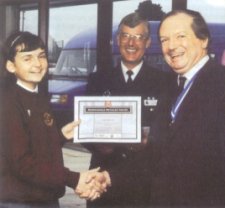Originally published in September-October 2004 icon
Colon Cancer - The Facts Colon Cancer Concern

Reacting Early Saved My Life
Tim Barnes talks to Melanie Hart about recovering from colon cancer
im Barnes has been a Police Constable in Dorset for more than 27 years. The warm, straight-talking father-of-three enjoys working with young people in his role as a school and community education officer.
Not one to shy away from the facts, he talks to them about many issues including the dangers of drugs. In his own life too, 50-year-old Tim has had to face the truth, and us convinced that’s why he has survived bowel cancer.
Just weeks after his first symptoms, he went along to his GP for an examination - something many men and women feel too embarrassed to do until the cancer has spread and is much more difficult to treat. Tim hopes that telling his story to icon will make people realise the need to get symptoms checked out quickly.
I’ve recently bought myself something I’ve wanted for a very long time - a Yamaha Wild Star Cruiser. I had a motorbike on and off over the years, but when really wanted one there always seemed to be something better to spend the money on, children, mortgages...we put so many things off in life, but I’m not going to any more. Last year I said to my wife, Chris, that I really wanted to get a bike and now we go off on it together. We’ve been to the Cotswolds, on visits to our eldest son, Stuart, in Exeter and have lovely days out.
Its a great change from the fear and stress I felt a couple of years ago. It all started in June 2002 and the easiest way to describe it is that I noticed a fairly drastic change in my habit. There was some blood in my stools, but the most significant thing was that I felt like needed to go more often during the day - rather than my usual morning and evening. It was uncomfortable and embarrassing as I was rushing off to go, but then couldn’t properly. It felt like I had a blockage.

A staff nurse realised by the look on my face, it was bad news she sat me down and held my
hand

I knew something wasn’t right. My father had had bowel cancer when l was about 15, and, a combination of my concerns about that and a bit of nagging from my wife and daughter, Gemma, got me to my doctor’s surgery in July. He couldn’t be certain there was a problem, but referred me to the Royal Bournemouth Hospital straight away because of my family history. When I got there, they examined me using a kind of scope. It wasn’t a proper scan, just a more in-depth look up my back passage. It was embarrassing, but just a job to them. The registrar told me be could see a large tumour in the rectal passage. I was absolutely shattered. Although Chris had asked me several times, ’Are you sure you don’t want me to come with you?’ I’d gone on my own not wanting to waste her time. So there I was hearing this news, and it was too much to take in. It was like I’d gone into a tunnel. He was talking tumours, and using the words ’surgery’ and ’colostomy bag’, and I was only getting every third word.
After a while he said, ’Oh you really should have someone with you’ and I remembered that Gemma, who was training to be a staff nurse at that time, was on duty that day. When she walked in and realised, by the look on my face, it was bad news she sat me down and held my hand. Then she got her notebook out and asked the registrar to tell her exactly what he’d told me, while she took notes. She was absolutely wonderful. He’d given me the worst case scenario, but still needed to investigate further before he could confirm anything. He took a biopsy and while that and the blood tests were going on I seemed to get over my initial shock.
I had three biopsies during July, waiting a week each time for the results, only to be told they were inconclusive. This was probably the most stressful time. We had a ’we-don’t-know-what-to-do-or-what-the-future-holds’ summer. No one could tell me whether the tumour was malignant or not even after MRI and ultrasound scans. Not knowing was by far the worst part. I had been told that if it was malignant, I would possibly have chemotherapy and radiotherapy, to reduce the tumour before the operation, because its position was very low down in my rectal passage, and it was very difficult to get at. However, at the end of August, my surgeon, Mr Fozard, said that because the biopsies were inconclusive, he didn’t want to put me through chemotherapy and radiotherapy unnecessarily. After a chat it was decided that he would operate, remove the tumour and then check to see what it was.

We had a ’we don’t know what to do or what the future holds’
summer

It would be fair to say that as an individual, and as a family,we handled each stage as it came. I couldn’t deal with the whole picture. I did meet some lovely people, though, like my colorectal specialist nurse, Jan Boot who explained the operation to me, and Bridget Owls, the stoma care nurse. I had the operation on September 10, during which they removed my rectal passage and part of my large intestine, and two weeks later I found out the tumour had been cancerous.
I stayed in hospital for nine days after the operation. I wasn’t in pain, just as weak as a kitten. Because the tumour was so low I have no rectal passage now. Basically, the large intestine has been stapled to my rectum so it’s a very quick exit. I have to be careful not to eat foods that cause too much wind, and have had to potty train again.
I started off with an ileostomy (a procedure which required me to wear a stomach bag to collect my stools). It doesn’t sound very glamorous, but it wasn’t inconvenient at all. Having the bag had been the part that had concerned me most before the operation, because I remember what a dreadful time my father had with his. The technology is so much better now, and the stoma nurses were brilliant and made sure I didn’t have any problems in hospital. They then came to see me during my first couple of weeks at home to make sure I could change the bags. It was easy, although I had a bit of a problem with my diet at the beginning. I had to avoid foods that pass straight through without being digested, like mushrooms, peas, sweetcorn and peanuts. I also had to eat skinned tomatoes and soft foods like mashed potato.
Looking back, everything happened so quickly. One minute I was a full-time PC, then suddenly I’m being operated on for what could be a life-threatening disease. I’ve never been more frightened in my life, but I came through it. I built up my strength gradually by going for increasingly longer walks, until I was able to walk up to the school where my wife worked to meet her for lunch. Then in December we flew off to Nashville to watch our youngest son, Ollie, compete in the UCWDC World Line Dancing Championships - something I’d been aiming for throughout my treatment!

I went back to hospital on January 21 2003 for the stoma closure operation. This was quite traumatic, and knocked me back more than I thought it would. Maybe because psychologically I’d thought,’ Oh this will be no big deal’. I was in hospital for nine days again, only this time I had the problems of lack of control over my bowel. I cried in hospital on more than one occasion. I always tried to remain positive but, despite the great support I got from the doctors, nurses, my family and friends, there were lonely times when I thought, ’God, I hope I get through all this!’ You don’t want to be potty training at the age of 49 - I felt like a child again - but everyone gave me such brilliant support and if I had problems, I could phone Jan Boot at any time. It was probably worse for me because I had more removed as the tumour was so low down. I wouldn’t think other people would have such problems. Jan is very pleased with me now because my habit is four times a day; whereas some people can go up to 20 times.
The Police Force has a rehabilitation centre in Oxfordshire, called Flint House and I went for 10 days in March 2003; the staff and facilities there were marvellous. It was a great break for me - and more importantly for my wife and children. They were able to relax and not worry about me, because they knew I was being very well cared for.
I went back to work virtually straight after my stay there - part time at first and then full time by the end of the summer. I was upfront with everyone, from the outset, and wanted people to know I’d had bowel cancer. I didn’t want anyone to be embarrassed, because you can easily say the wrong thing. I know some people cope with it by keeping quiet, but that’s not me. I found it a lot easier that people knew and my colleagues did too. They were able to support me and understood if I needed to dash off to the toilet, rather than the stress of keeping it quiet and people saying, ’Where’s Tim gone?’

It’s a very curable disease, if caught in time so why are all these people dying?

The most surprising thing about all this, for me, has been the psychological effect. I went through a period of quite serious depression once I was physically better I have had psychotherapy sessions, which have helped me cope with the emotional side, and I only get the odd down day now.
Because my father and I both had bowel cancer, l am concerned for my children. Its early days yet, but I have been referred to the Wessex Clinical Genetics Service at Southampton Hospital. They are investigating whether there is a definite hereditary link. I’m also taking part in the CAPP 2 Project - a research project looking into the effectiveness of resistance starch, at coating the bowel, and aspirin in reducing the formation of polyps. Tumours can’t grow on their own. They grow from a polyp, but if you’ve got polyps it doesn’t necessarily mean they are going to grow into tumours. I’m six months into this three-year project, and am taking two sachets of resistance starch and two aspirins every morning (at least I think I am... they might be placebos, I’m not sure). I will have a basic check-up, blood tests and a colonoscopy every year. My last was in October which showed I’m currently free of cancer.
Jan Boot and the three colorectal specialist nurses recently approached me and others to see if we were interested in being part of a local support group.
We meet quarterly at the moment, but are intending to support people on the phone. Chris is also willing to speak to people on the phone because family support, although not exactly overlooked, is maybe not fully recognised.

Bowel Cancer affects 35,000 people in the UK every year, of whom 16,000 will die.
These figures really concern me and that’s why I’ve agreed to work with Colon Cancer Concern (CCC), the UK’s leading bowel cancer charity. It’s a very curable disease, if caught in time so why are all these people dying? I believe its because they’re not aware of the disease, and not getting treated early enough. I don’t know if it’s part of being British, and not wanting to talk about back passages and messy things, but I’m absolutely convinced this attitude is costing lives. People don’t pay enough attention to what’s happening in that area of their body, and tend to be reticent about going to doctors to talk about it - especially older men. There was a chap in hospital with me who’d had problems for two years before seeing his GP! People must go as soon as they start having problems. Reading early, and being upfront about it, certainly saved my life - and if I can get that message across then we can save a few more.
I’m feeling very positive about the future now. My outlook on life has changed and I intend to do the things I’ve always wanted to. I’ve got less than three years until I retire from the Force, and Chris and I have started planning for the future now that the children have all left home. We are going to downsize so that we can travel more, have fun and think about ourselves for a change!"
For more information on bowel cancer visit the Colon Cancer Concern website: http://www.coloncancer.org.uk or call the CCC lnfoline 08708 50 60 50.